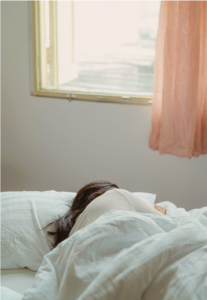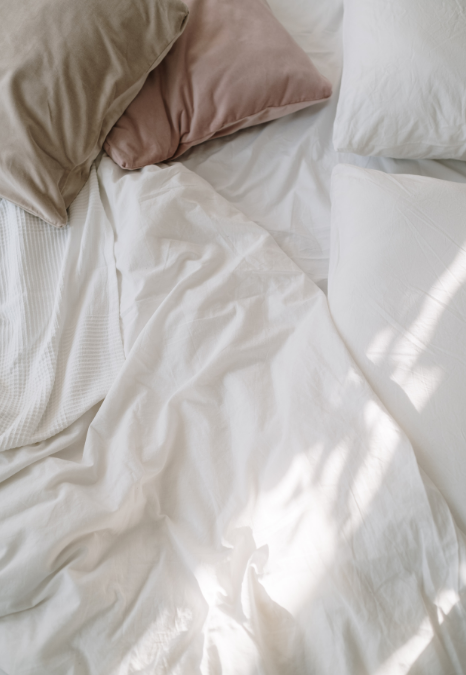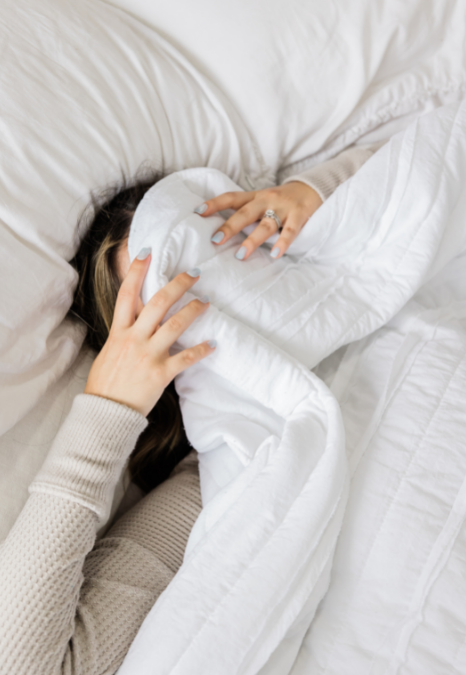Tuesday 1st of March, 2022.
Written by Clinical Psychologist, Ebony Collins.
THE BASICS OF SLEEP
Last month we talked about the benefits of sleep, diet and exercise on our mental health. Today we take a deeper look at just how important sleep really is to our well being and in particular for those with mental health problems. The effects of sleep deprivation are well known. We have all heard the saying ‘you woke up on the wrong side of the bed’. Sleep deprivation has been named the second biggest killer on the roads after alcohol due to the profound effects it can have on our functioning. But just how much does sleep affect our mental health and is this worse for someone experiencing a mental illness?
SLEEP BASICS
 Sleep can be classed in two categories; non-rapid eye movement (NREM) sleep (referred to as deep sleep) and rapid eye movement (REM) sleep. There is one stage of NREM sleep which lasts the longest out of the four stages. Brain activity is slowed during deep sleep and quickly increases during the remaining stages of REM sleep which is known for being the dreaming stage of sleep. As we sleep the length of time it takes to move through the stages of sleep changes from 70-120 minutes. Age plays a part in how much we sleep. In general, the length of sleep decreases over time with the recommended length of sleep being 7-8 hours for an adult.
Sleep can be classed in two categories; non-rapid eye movement (NREM) sleep (referred to as deep sleep) and rapid eye movement (REM) sleep. There is one stage of NREM sleep which lasts the longest out of the four stages. Brain activity is slowed during deep sleep and quickly increases during the remaining stages of REM sleep which is known for being the dreaming stage of sleep. As we sleep the length of time it takes to move through the stages of sleep changes from 70-120 minutes. Age plays a part in how much we sleep. In general, the length of sleep decreases over time with the recommended length of sleep being 7-8 hours for an adult.
Our sleep runs off a cycle known as a circadian rhythm. Circadian rhythms regulate both mental and physical systems throughout the body. A number of our bodily processes such as temperature, digestion, hormone production and other systems all run to this 24 hour cycle. These systems work in with one another by aligning their rhythms to this cycle. For example, our temperature increases in the evening in preparation for being inactive while we sleep. It decreases in the morning in preparation for us to become active once again. Our digestive systems activates during the day to process meals, and our endocrine system produces hormones to support energy expenditure through the day. These system deactivate through the night. We want to have digested our meals through the day and eliminated them, to prevent needing to wake through the night to eat a meal or access the toilet. By working together they provide us with the ideal conditions for sleep.
When it comes to our mental health (and overall health) it is deep sleep that matters most. The majority of deep sleep occurs in the first five hours. During this phase our bodies are working to restore depleted levels of hormones, as well as repair and heal our various systems. During sleep our brain is working to process all of the new information we took in from the day. While the mechanics of how exactly the brain processes this information is unknown, research has confirmed that our brains are doing a lot as we sleep. One of the reasons that teens are recommended to have 9-10 hours of sleep per night is due to the amount of information that the brain needs to process overnight.
SLEEP ISSUES
It is estimated that more than a third of adults are not getting enough sleep. This sleep deprivation can lead to a range of consequences including poor concentration, irritability, weakened immune health, and in the long term can lead to chronic health conditions. Most people will understand the difficulty in coping with even minor stressors after a night of poor sleep.
Many mental illnesses have sleep issues as part of the symptom profile. Changes in sleep either an increase or decrease in the quantity or quality of the sleep are commonly listed symptoms for number of mood and anxiety disorders as well as psychotic disorders. Patterns of poor sleep can include delays in falling asleep, waking through the night, waking early, not getting enough sleep, and general poor quality of sleep. Each of these sleep issues can develop into a range of disorders (for more information on sleep disorders refer to the resource links at the bottom of the article).
The effects of even one night of poor sleep can be felt the next day. Longer term sleep issues can significantly effect our mental health with research now exploring the question of which came first; the sleep issue or the mental illness. Given the impact that sleep issues can have on our hormone production, brain function, and overall resilience, research is now considering sleep as one of the key risk factors for mental illness as well as one of the important areas to address when experiencing an illness.
Sleep deprivation as effect our ability to regulate emotions in as little as one night. The profound decrease in emotion regulation is linked to the effects on the brain and the hormone production which is depleted from the lack of sleep. Resilience has been a word that we have all heard over recent years. A lack of sleep impairs our resilience. This reduced resilience diminishes our general wellbeing. For someone with a mental illness this can impede an already lowered level of resilience.


TIPS FOR IMPROVING YOUR SLEEP
Findings ways to improve sleep quality and quantity can be helpful in minimising the risks to your mental health. Some simple strategies could help to improve your sleep. An underlying sleep disorder or a medical condition might be playing a role in your sleep issues it is important to speak with doctor if your sleep problems persist.
There is a long list of strategies which are referred to a ‘sleep hygiene’. These strategies are designed to give you the optimal conditions for sleep.
- Caffeine, alcohol, exercise, study/work, anything that keeps your brain or body alert should be avoided in the evening.
- Naps should ideally be avoided if you are having trouble with your sleep. If you can not get through the day without a nap then keep it to 30 minutes and prior to 3pm.
- Get a sleep schedule that has you going to bed and waking up at the same time each day. This helps to train the body and supports our circadian rhythms. If you are having trouble getting a schedule then remember that there are ways to be woken up in the morning but it is harder to make your fall asleep. So aim for the set wake up time and your body will eventually fall in line of an evening.
- Develop a sleep routine. Before bed repeat the same few activities to signal to your brain that this is bed time. This might be doing a gentle stretch routine (to help relax the muscles), taking a shower, listening to a meditation, or any combination of quiet activities that are not stimulating to the brain.
- Keep bed for sleep and sex only. Avoid working, eating, being on your phone or watching tv in bed. Your brain becomes confused about the purpose of being in bed if you use it for a range of activities.
- Reduce light of an evening and try to get sunlight in the morning to help support your circadian rhythms. Most devices have day night settings that allows you to turn off the blue light that is signaling to your brain that it is daytime.
- Make sure you are giving yourself enough wind down time in the evening to allow your brain to slow down and relax. A lot of people stay up late because they want this relax time. Try to start it earlier to avoid this.
- Avoid over heating yourself, remember your body temperature will increase on this own.
- If you can not sleep then after 20 minutes get out of bed and find a quiet activity to do until you start to feel sleepy.
This information is not even scratching the surface when it comes to the world of sleep. It is a truly fascinating topic and there is a wealth of information out there. If you are interested in finding out more try the links below.






